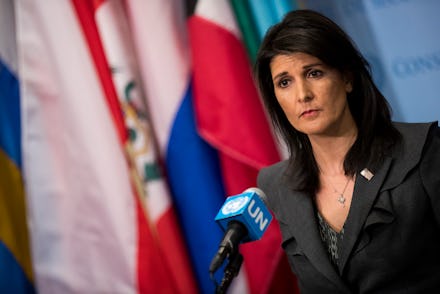Nikki Haley says Trump’s “button” tweet was part of a strategy to keep Kim Jong Un ‘on his toes’

President Donald Trump was widely criticized for his recent tweet comparing his “nuclear button” with that of North Korean leader Kim Jong Un — but United Nations ambassador Nikki Haley said Sunday that the controversial tweet was simply the president keeping Kim “on his toes.”
Haley responded to the tweet during an appearance on ABC’s This Week, telling host George Stephanopoulos: “I think that he always has to keep Kim on his toes. It’s very important that we don’t ever let him get so arrogant that he doesn’t realize the reality of what would happen if he started a nuclear war.”
The president’s Tuesday tweet came in response to the North Korean leader saying in a speech that “a nuclear button is always on the desk of my office,” warning “the United States can never fight a war against me and our state.”
“Will someone from his depleted and food starved regime please inform him that I too have a Nuclear Button, but it is a much bigger & more powerful one than his, and my Button works!” Trump tweeted in response.
When asked if the tweet hurts the country’s credibility with our allies — as former Vice President Joe Biden suggested in an interview — Haley said the tweet was a signal that the U.S. is “not letting up on its pressure.”
“They don’t wonder if we know what the hell we’re doing. I think it’s very clear we do,” Haley said. “What they know is we’re not letting up on the pressure. We’re not going to let them go and dramatize the fact that they have a button right on their desk and they can destroy America. We want to always remind them, ‘We can destroy you, too, so be very cautious and careful with your words and what you do.’”
Haley also noted during the interview that in her experience dealing with diplomats and leaders from around the world, the president’s Twitter habit is viewed as “unpredictable” — but necessarily not in a bad way.
“I don’t thing they’re tuning [Trump’s tweets] out,” Haley said about the foreign officials. “If anything, I notice that they’re are absolutely glued to them, but they see him as unpredictable.”
“Too unpredictable?” Stephanopoulos asked.
“I don’t think ever too unpredictable,” Haley responded. “I think they don’t know what the U.S. is going to do at any given time, and so for that reason they’re getting much more cautious and they’re paying attention to how they work with us. So, you know, we’ve got a ways to go, but it’s not a bad thing, it’s really not.”
When it comes to handling relations with North Korea, however, Haley gave a more bleak response. The ambassador suggested that “a lot of things have to happen” before the U.S. would begin talks with the volatile nation, such as North Korea agreeing to stop their nuclear testing and be willing to discuss banning their nuclear weapons.
Haley also wouldn’t deny assertions by others that the U.S. is “closer to war with North Korea.”
“It’s a dangerous situation,” Haley said. “It’s not something we want. We have said that multiple times. The president said it. Every member of this administration has said it. But the reality is this is a very dangerous situation.”